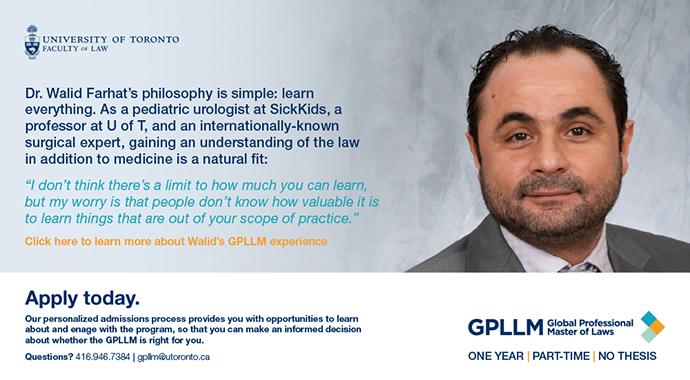Secondary menu
Student Showcase: Walid Farhat

If you assumed Dr. Walid Farhat’s professional plate was overflowing, you would be right. A pediatric urologist at Toronto’s Hospital for Sick Children, Walid is also a professor at the University of Toronto, an associate surgeon-in-chief for education and an internationally renowned expert on minimally invasive pediatric urological surgery. He runs an annual course at SickKids that brings in surgeons from around the globe, and similarly teaches and shares his surgical skills abroad during humanitarian trips he regularly makes to countries including Ukraine, Peru, Armenia and Jamaica.
Into that packed schedule, Walid made time to earn a GPLLM. We weren’t the first to ask why. “A lot of people ask me the question,” he says. “If there was any one area that I read a lot about and communicated with those who practiced it, it is law, I could never understand lawyer language. Whether it was as basic as to change a consent form or more complex to assisting someone in a legal case as an expert, I always had this feeling that we were basically speaking different languages.”
Medical education does nothing to prepare doctors for the legal issues they will surely face, Walid realized. How could he be more helpful when these challenges arose around him or his colleagues? What approaches worked best and most efficiently? “I was surprised that the law is very much reliant on precedents. I didn’t know that,” he says. “When I used to talk to lawyers I always felt like the case they had at hand was the only case they wanted to consider”. Walid found a key similarity between the professions, noting that surgeons look at previous cases too when they decide on a plan to operate.
Equipped with a wealth of new knowledge, Walid hopes he’ll be a lot more useful in medical-legal cases going forward, helping lawyers streamline their case research and helping medical colleagues decipher the law. He also aims to get more involved with the College of Physicians and Surgeons or Canadian Medical Protective Association and their committees dealing with public complaints and medico-legal issues. “If I face a legal case now, or I’m approached for some advice, I’d look up the legal logs from previous years and I’d understand more about the legal issues than I used to,” he says.
That’s why he is urging colleagues to check it out too. “I don’t think there’s a limit to how much you can learn. But my worry is that people don’t know how valuable it is to learn things that are out of their scope of practice.”
